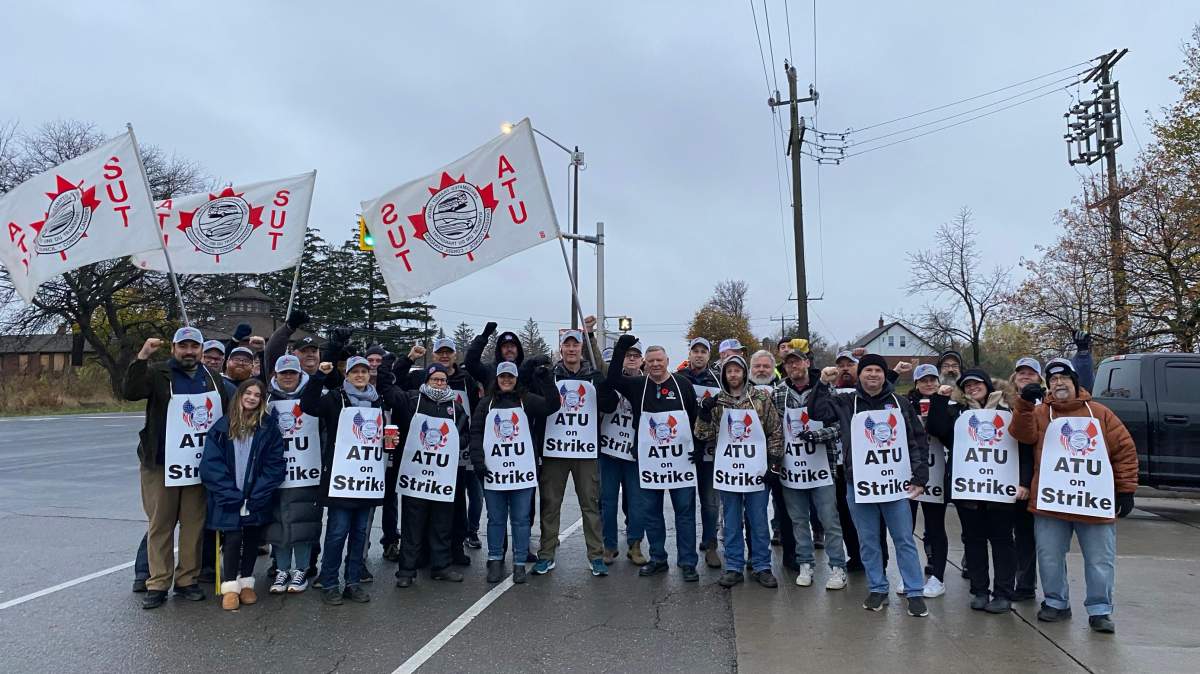Hamilton’s transit workers are off the job, officially beginning strike action early Thursday morning.

Members of ATU Local 107 began picketing outside the HSR Mountain transit center on Upper James after they failed to reach a deal with city negotiators before the deadline of one minute past midnight.
Despite the job action, ATU president Eric Tuck says his bargaining team is ready to go back to the table at any time.
“When the city is ready to make a move we’re here ready to sit down and have those talks, but it takes two to bargain,” Tuck said.
“We’re not going to bargain with ourselves. So if they’re prepared to move off of their current position, then we’re certainly open to sit down and have a productive discussion.”
Following a rally at Frank Cooke Terminal on MacNab Street, the local and supporters marched to city hall prior to a press conference held by Mayor Andrea Horvath and other city staff in response to the strike.
Horwath submitted that the city’s final offer is “reasonable and will not change” arguing negotiations are “underpinned by facts” that can’t be altered, connecting the union’s ask with council’s plight to lower a potential 14 per cent property tax increase next year.
“The reason we have not yet come to an agreement comes down to one thing and one thing alone. Wages,” she said.
She argued that a concession would create “pattern bargaining” resulting in having to extend similar offers to other unions since a precedent has been set.
“We have 11 unions that represent those workers,” said Horwath.
” A 23 per cent increase for all 11 city of Hamilton unions would translate into … $113 million over the next four years.”
Little was accomplished Tuesday after negotiators decided to call off talks in the early afternoon.

Get daily National news
ATU Local 107 president Eric Tuck said city staff and the HSR didn’t bring anything new to the table and opted only to discuss strike protocol for Thursday when buses stop running.
“The employer started the day by offering us a set of strike protocols, which we refused to sign,” Tuck explained.
- Federal government raises concerns over OpenAI safety measures after B.C. tragedy
- Free room and board? 60% of Canadian parents to offer it during post-secondary
- Ipsos poll suggests Canada more united than in 2019, despite Alberta tensions
- Indigenous leaders outline priorities for spring sitting of Parliament
“We then asked the employer straight out if they had anything further to offer in the hopes of averting a strike or disruption of service … the employer made it clear … they had nothing more to improve that final offer.”
Acting city manager Carlyle Khan said from the city’s point of view, it’s now a “wait-and-see” situation over the next few days.
“So I think that if they work together … be creative and look for solutions … keeping in mind (it’s) the customers that are impacted, they will have a positive outcome,” Khan said.
In a statement Tuesday night, the city said a meeting earlier in the day was adjourned when the ATU was unwilling to reduce monetary demands and didn’t agree to strike protocols.
The city says the current offer declined is around $80,000 in the fourth year of the agreement, representing a salary increase of 12.75 per cent over the life of the contract.
Tuck says members showed up “in record numbers” on Sunday, agreeing with negotiators’ recommendations to reject the city’s last contract offer made Oct. 24 that they say doesn’t keep up with growing inflation.
He insists the decision was not made lightly and that withdrawing services for “dependent Hamiltonians” is not desirable.
“We haven’t done it in the last 25 years,” Tuck said.
“But there are times when given the economic times in the market that we’re living in where you have to demand wages to keep pace with inflation and are reflective of that market.”
Transit workers voted 94 per cent to reject the city’s last offer and say there are other GTA transit agencies, like Brampton and Mississauga, that have better packages for workers, creating a vacuum in hiring and retaining workers.
Executive director of human resources Lora Fontana said the city’s final offer would put operators third in Ontario for salary, behind Brampton and Mississauga bus service workers who make $3 more per hour.
“With what we’ve proposed, they would be earning almost $80,000 a year and that is exclusive of any overtime or premiums,” Fontana said.
Tuck countered saying GO Transit wages, as well as what TTC workers get was left off the city’s list of examples which actually places HSR workers sixth or seventh in Ontario.
“We know for a fact that Mississauga is in negotiations and they’re already $3 ahead of us,” said Tuck
“The reality is my members can go 45 minutes to a half-hour down the road and get a job for $3 to $5 an hour more.”
Hamilton’s last transit strike was in 1998 and lasted 12 weeks.
Khan’s advice for riders who will have to cope with the potential lack of bus service is to seek out some sort of carpooling or ride-sharing, including the use of the city’s Smart Commute website.
Outside of those options, the only other contingency is a recommendation that users walk or cycle, if weather permits, or ask an employer for permission to work from home.
Those who have purchased monthly passes will automatically have strike days refunded back to Presto cards, according to Khan.
Staff have also reached out to community agencies in an effort to extend refunds on ticket purchases.











Comments
Want to discuss? Please read our Commenting Policy first.